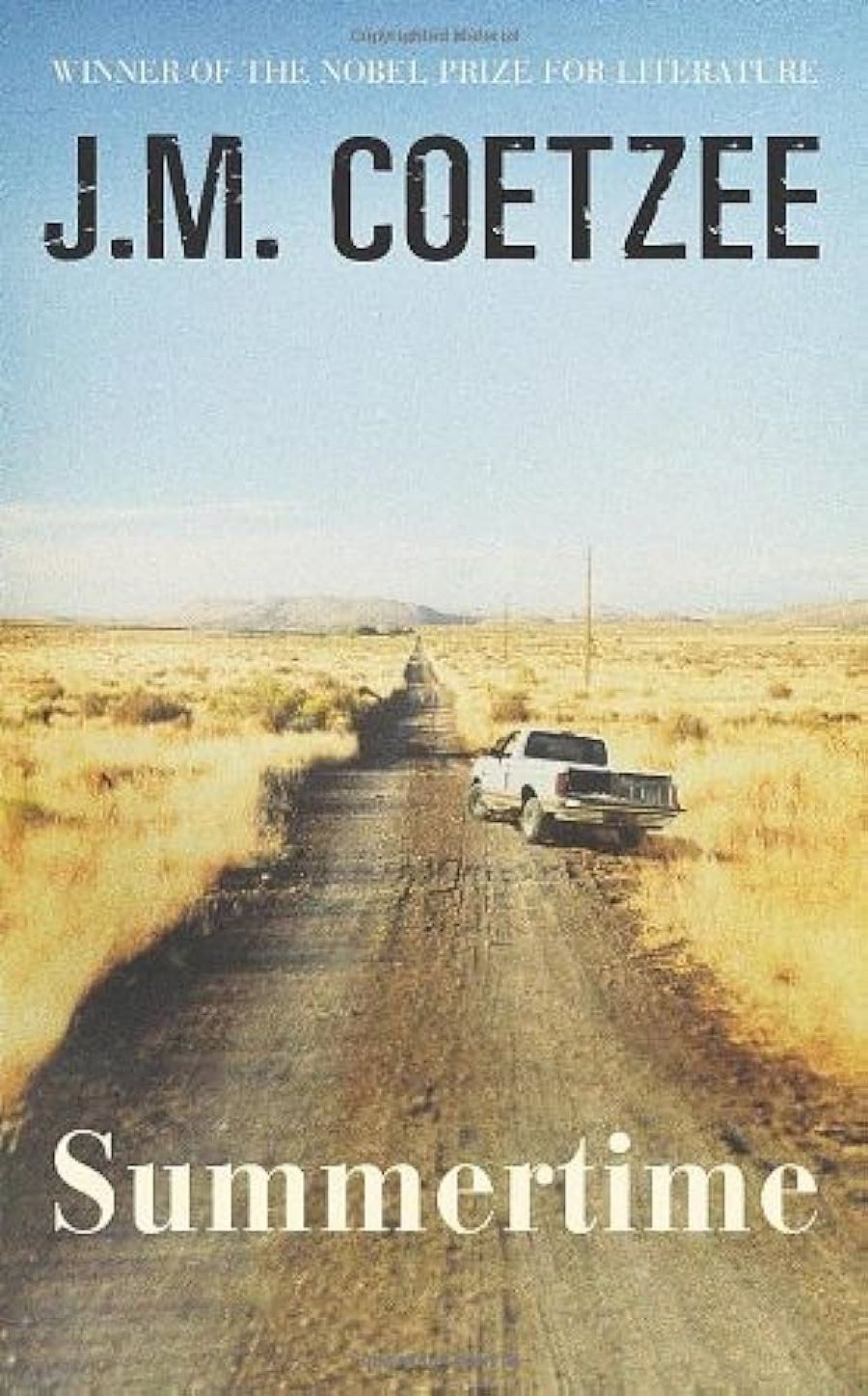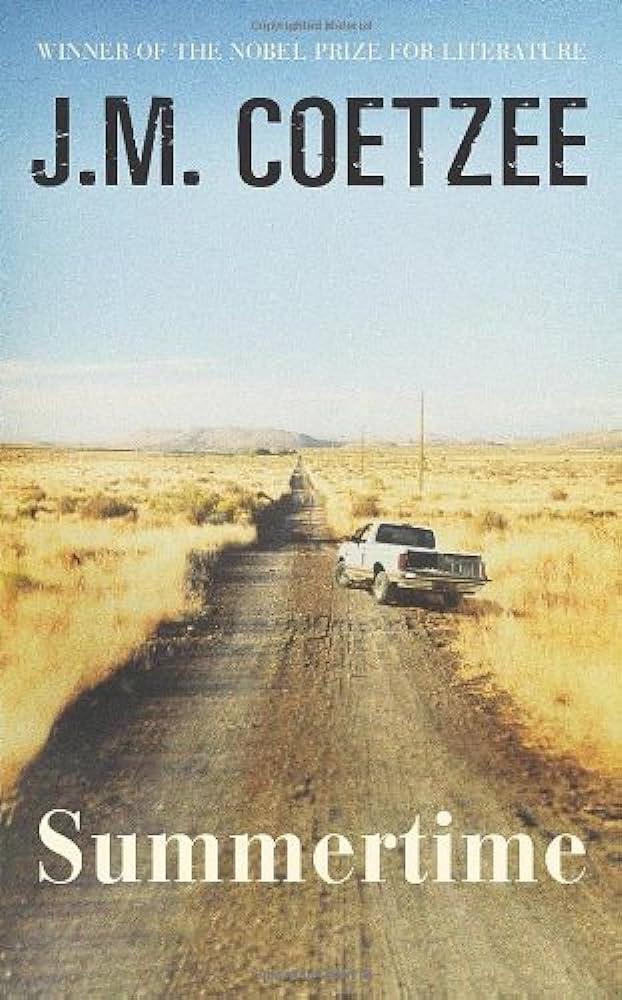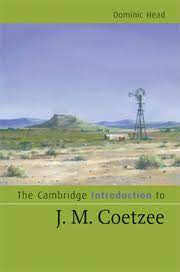
- Free Article: No
- Contents Category: Fiction
- Review Article: Yes
- Article Title: Scourging negativity in J.M. Coetzee’s new ‘novel’
- Online Only: No
- Custom Highlight Text:
Over the course of his long and distinguished career, J.M. Coetzee has written fiction in an array of modes and genres. His books include works of historical and epistolary fiction, realism, allegory and metafiction. He has written novels that have developed complex and evocative intertextual relationships with some of his most significant literary influences – Daniel Defoe, Fyodor Dostoevsky, Franz Kafka – and, in his recent writing, he has experimented with prose that is frankly discursive to the point of didacticism, using a fictional framework to problematise and interrogate statements that, given a different context, could be read as straightforward declarations of belief.
- Book 1 Title: Summertime
- Book 1 Subtitle: Scenes from provincial life
- Book 1 Biblio: Knopf, $39.95 hb, 266 pp
- Book 1 Cover Small (400 x 600):

- Book 1 Cover (800 x 1200):

- Book 2 Title: The Cambridge Introduction to J.M. Coetzee
- Book 2 Biblio: Cambridge University Press, $34.95 pb, 130 pp
- Book 2 Cover Small (400 x 600):

- Book 2 Cover (800 x 1200):

A unifying concern of this diverse body of work is Coetzee’s interest in the limits of expression. The concentrated power of his best novels lies in their ability, not simply to make the reader aware of the contextual pressure that bears down upon every word, but to reveal the extent to which a decision to adopt a particular mode of address or point of view inevitably constrains the individual utterance and excludes other points of view. As Derek Attridge has argued in his important study J.M. Coetzee and the Ethics of Reading (2004), one of the most significant questions Coetzee’s fiction confronts is how to acknowledge these excluded perspectives; how to make their absence felt. Coetzee’s writing is highly conscious of the generic implications of any attempt at representation, yet seeks to expose the ways in which the genre is impure or unstable. Thus it is often the silences and counter-voices in his novels which command attention: the way Susan Barton’s narration in Foe (1986), for example, is troubled by the problem of how to bear witness to Friday’s mute suffering; or the apposite criticisms of David Lurie’s self-involvement that are levelled at him by his daughter, Lucy, in Disgrace (1999).
Lucy’s silence about the details of her rape – which is not depicted, though it is the novel’s central incident – is in many ways a typically Coetzeean gesture of refusal. By insisting that her violation is a personal matter that should not be taken into the public realm of the justice system, she implies that the existing legal order cannot adequately address the reality or the meaning of her ordeal, but also that the experience remains, in an important sense, beyond the reach of language. Lucy stakes out a private space, which she purchases at the price of a certain inscrutability, striking a compromise in the process between stoic dignity and a self-abasing acceptance of her victimhood.
Her refusal to speak is an unhappy example of the deep suspicion of self-revelation, the overriding sense of its essentially compromised nature, that runs throughout Coetzee’s later work. Some of the mixed reception afforded his recent novels Elizabeth Costello (2003) and Diary of a Bad Year (2007) was based on the perception that their protagonists were simply mouthpieces for their author’s opinions. But while it seems reasonable to assume that Coetzee sympathises with the views of Elizabeth Costello and JC, these novels are as concerned with the question of what it means to express a personal opinion as they are with the opinions themselves.
What makes Elizabeth Costello such an engaging and provocative work – more so than the intriguing but awkward Diary of a Bad Year – is the depiction of its title character’s frailty and vulnerability; the way it exposes the weakness of her arguments. There is pathos, as well as gentle humour, in her struggle to give a rational account of convictions that are deeply held but not strictly rational. Elizabeth Costello can be interpreted as a work of personal revelation, but the weight of sincerity would seem to rest with its doubts, hesitations and contradictions. Like all of Coetzee’s fiction, it is meant to be read against the grain. As Mrs Curren writes in the long confessional letter that is Age of Iron (1990): ‘Do not read in sympathy with me. Let your heart not beat with mine.’
In this sense, Coetzee’s sequence of autobiographical works, of which Summertime: Scenes from Provincial Life is the third, needs to be approached with a degree of interpretative caution. In the overview of the author’s life that begins his informative critical monograph, The Cambridge Introduction to J.M. Coetzee, Dominic Head makes the point that ‘Coetzee is a very private person who has a reputation for being unforthcoming with interviewers. This means the available details of Coetzee’s life are sparse (and not truly verifiable).’ Beyond the basic facts of his education, his academic career and his literary achievements, there is so little to reveal that Head’s opening chapter becomes less a discussion of ‘Coetzee’s life’ than a reading of Boyhood: Scenes from Provincial Life (1997) and its sequel, Youth (2002). These two ambiguous works, he notes, ‘inhabit the border between fiction and autobiography’. They establish and carefully maintain an ironic distance between the author and his younger self that ‘unsettles the plausibility of the self-portrait’. Youth, in particular, whose deadpan mockery of its protagonist’s callow literary pretensions makes it the funniest book in the series, is interpreted by Head as a work that sets out to depict ‘all that is ignoble in John, as a central feature of its explosion of the idea of the great artist. At one level Youth is a formal experiment that exposes that false ideology, while simultaneously deconstructing the genre of the personal memoir. It is unsurprising there has been no third installment.’
The last remark demonstrates the perils of making conclusive statements about the intentions of a living author, but Head’s assessment is not entirely off the mark. Summertime, which is set in South Africa in the 1970s, when Coetzee was in his mid-thirties, is a sequel to Boyhood and Youth, but breaks away from their detached style of third-person narration. It is the only work in the trilogy to be packaged unambiguously as fiction. (My paperback edition of Boyhood, which I retrieved from the fiction section of my local bookshop, calls itself a ‘memoir’; my copy of Youth is non-committal about its generic affiliation, though the phrasing of the jacket blurb could easily lead a person to assume it is a novel.)
Summertime’s premise is that the famous writer John Coetzee has recently died. A biographer, Mr Vincent, is researching this period of his subject’s life and conducting interviews with various acquaintances who knew John during this time, including a former lover, his cousin, the mother of one of his students, and two academic colleagues. The majority of the book consists of transcripts of these interviews.
Summertime thus presents itself as a kind of inside-out biography that exposes and satirises the disreputable methods by which such works are assembled. Like Philip Roth’s final Zuckerman novel, Exit Ghost (2007), it can be read as a pre-emptive strike against prospective biographers, undermining the idea that knowledge of the author’s private life might enhance our appreciation of his writing. For what is foregrounded in these raw interviews is their unreliability. Early in the book, Vincent reveals that he made no attempt to meet or communicate with his now deceased subject, because he wanted to be ‘free to write what [he] wished’. His first interviewee, Julia, announces that she is making up the dialogue in the conversations she is pretending to remember and, echoing Lucy’s challenge to her father, asserts her right to be the centre of her own story, not a minor character in someone else’s. In the second interview, with John’s cousin Margot, the questioning process is inverted: the biographer reads her a draft of the text he has constructed from a previous interview, only to have her interrupt repeatedly, objecting to his misrepresentations.
Nevertheless, from the accumulated testimony a portrait emerges. It is highly unflattering. Throughout the trilogy, John Coetzee has been depicted as someone who is shy and self-absorbed, but the older he gets the less excusable his selfishness becomes. In Summertime, his acquaintances encounter him in a variety of contexts, but there is a consistency to their impressions. John is remembered as cold, uncommunicative and socially inept. He appears uncomfortable, ill at ease in his own body. He is clumsy in his pursuit of women, and his attempts to establish a genuine emotional connection with them end in humiliation. He has no sexual allure. Julia describes his lovemaking as so remote that he seems ‘autistic’. His oddness and his failure to conform to a certain idea of South African manhood (it is rumoured he writes poetry) leads to general bewilderment and speculation that he may be a ‘moffie’, or homosexual. Even his relatively sympathetic cousin, to whom he reveals his gushing romantic side, finds his impracticality exasperating.
The final two interviews – with his former academic colleagues, Martin and Sophie – extend the damning critique to include John’s politics and his writing. He is ‘prickly, opinionated, incompetent, ridiculous’. His view of the world is utopian and naïve. He has no original insight into the human condition. His work is too sterile and controlled to achieve greatness. As Martin suggests, he is a comic figure, a walking joke: a man who believes in Dionysianism – in theory.
There is something more than demystification going on here. The novel’s use of multiple perspectives often makes John seem distant, almost a secondary figure in his own book, as the personalities of the various interviewees assert themselves, but it also functions as a way to voice – indeed, to overstate – every imaginable self-doubt and criticism in a blunt and objective manner. Summertime uses this scourging negativity in the way that Thomas Bernhard’s novels use anger: it becomes the book’s driving force, the source of its intellectual and creative energy. Its peculiar tension derives from the balance it strikes between pity for the poor sap’s ineptitude and a controlled bathos that is sometimes reminiscent of the comedy of embarrassment practised by television shows such as The Office. This takes on a weird sheen in light of the implicit understanding that this dork actually ends up winning the Nobel Prize. But it also explores, in a particularly ruthless way, the idea that our public self is not our own. It gestures toward the considerable part of John’s being that is held back when he steps into a social situation, drawing out the way his instinctive reserve distorts his intentions and queers his attempts to communicate.
As Head points out, the formal adventurousness and generic self-consciousness of Coetzee’s writing has sometimes led to his being described as a ‘postmodern’ writer, but many Coetzee scholars, including Attridge, prefer to classify him as a ‘late modernist’. The distinction is important, partly because the dread word ‘postmodern’ has been so relentlessly abused as to be irredeemable, but, more importantly, because postmodernism does not simply suggest that all meaning is a function of unstable, competing texts; it implies a celebratory stance toward this indeterminacy.
Coetzee’s work has an ambiguous relationship with this idea. It understands the implications of the ‘fall’ into textuality, but displays a profound unease with them. Much of his writing can be understood as an attempt to move beyond the impasse. Head certainly reads Coetzee’s fiction as being influenced by, and as responding to, the critique of traditional humanist assumptions advanced by post-structuralism and post-colonial thought. Life and Times of Michael K (1983), in particular, he interprets as a kind of deconstruction of deconstruction, seeing it as a novel that draws upon the existentialist tradition to evoke an ‘idea of Being’, which gestures beyond the textual surface to imply ‘a state of existence prior to knowledge’.
Summertime can be seen, in this light, as an extension of the various attempts in Coetzee’s recent fiction to make the compromised nature of self-expression itself the vehicle of self-expression: another attempt to enlist a heavily ironised literary formalism in the service of a guerilla raid on sincerity. By coming at its subject at an angle, it seeks to avoid the self-interest that shadows any attempt at self-revelation. Late in the book, Vincent suggests that the undignified portrait of John Coetzee that is emerging might reveal ‘someone more uncertain of himself, more confused, more human’ than is commonly assumed. This is not the kind of remark that Coetzee is apt to introduce without an ironic counterpoint, and the line demands to be read against the recurring suggestion that John is somehow, as Julia puts it, ‘not human, not fully human’.
But among the textual feints and carefully crafted ironies there is genuine depth of feeling. The interview transcripts are bookended by two short sections from John’s notebooks, written in the fictionalised third-person style of Boyhood and Youth. In these John displays his awareness of the poor impression he creates, recognising himself as a ‘gloomy fellow; a wet blanket; a stick in the mud’. The journal entries are interrupted by comments, written later, which act as a metanarrative to the themes implied in the entries and the book as a whole. The very first of these reads: ‘To be expanded on: his father’s response to the times as compared to his own; their differences, their (overriding) similarities.’
This underlying theme, hidden in plain sight, is Summertime’s core. The relationship between the two men is for most of the book seen only indirectly and in a fragmented way, but the silence of John’s father is made to speak eloquently of his sense of defeat and resignation. The two men are thrown together because they have no one else left; their relationship is strained and awkward because they are so alike. As Julia observes, they are ‘both loners. Socially inept. Repressed, in the wider sense of the word.’
In its final pages, the novel reveals itself not merely as a confession but as an apology. The conclusion leaves us poised at a terrible moment of decision. It is a devastating end to a work that is every bit as original and challenging as one would expect from a writer who has so consistently and intelligently dedicated himself to pushing the boundaries of what great fiction can do.


Comments powered by CComment